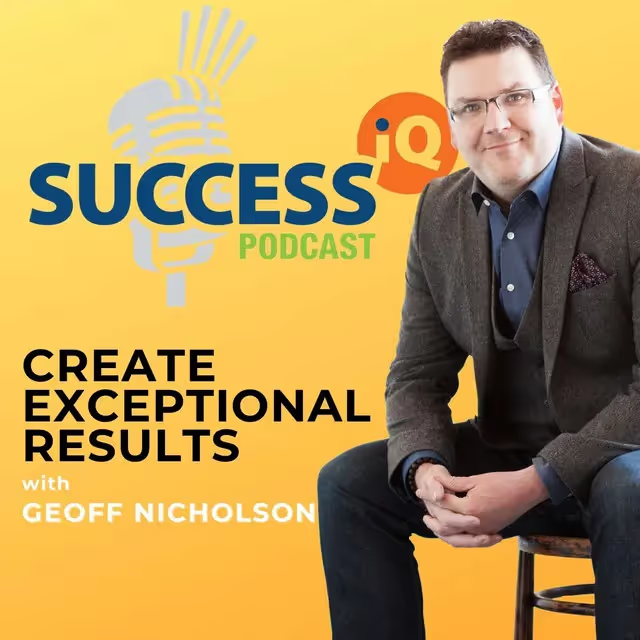
If you are here it is because you heard Geoff Nicholson and Rob on the Success IQ podcast talking about business, pricing, sales and marketing.
If you are here it is because you heard Geoff Nicholson and me talking on the Success IQ podcast. I hope you had as much fun listening to us as I did talking to Geoff. He is a wonderful host who is passionate about introducing you to the people and ideas that can improve your life.
Robin Waite is a husband and father to two young girls, with a passion to help business owners set fearless goals and achieve great success.
Robin is a business coach, regular speaker at various business events and bestselling author of two books, including the recent popular release Take Your Shot. He puts his decade of business leadership experience to work, coaching clients to reach their goals.
To access bonus content and so much more you can get that by visiting my website.
If you have found anything useful in this episode, then please leave a comment and rate the show. If you would like to ask Geoff a question or suggest a topic to cover on the show, please email him at podcast@geoffnicholson.co.uk
Get all the latest information about the show at the shows facebook page and join in on some of the Facebook Lives, it would be lovely to see you there
Pricing is something that is hard for many people in business. Pricing requires a lot of thought, and it can be difficult to know where to start. In this episode of the Success IQ Podcast, we have someone who has been a guest on our show talking about pricing. We hope you enjoy it!
Pricing is something that is hard for many people in business. Pricing is not just about the product and it's not just about the customer; it's a reflection of your business.
If you're having trouble with pricing, here are five things to consider:
You can get a good idea of what your product is worth by asking your customers. Start by asking them what they think the value of their own products or services are, then follow up with why they feel this way.
If you're not comfortable asking people directly how much they would pay for something, try asking friends and family members. They may be more honest than strangers who don't know you very well! If all else fails, look at similar products in the market (or even competitors' products) and see how much they cost compared to yours--this will give you an idea of where your price should fall within that range.
You might be asking yourself, "How do I know how much to charge for my goods and services?" The answer depends on a number of factors:
Pricing by empathy is the process of understanding your customers and their needs, then creating a price that makes sense for them.
This is important because most companies don't think about pricing from this perspective. Instead, they focus on how much money they can make from each customer or what their competitors charge for similar products and services. But if you understand why someone will buy from you instead of your competitor--and if that reason isn't just because they're more expensive--you have an advantage over everyone else in the market!
The next step is to figure out what your guest price point should be.
There are several ways you can do this:
Customer-driven pricing is a way of setting your prices that's based on the needs and preferences of your customers. It involves asking them what they're willing to pay and then setting your price accordingly.
There are two main benefits to this approach: first, it allows you to charge more than you would have otherwise because it gives customers a sense of value; second, it helps you avoid underpricing yourself on certain items or services that may actually be worth more than their competitors' offerings (which can lead to losing money). On the other hand, there are some drawbacks too--if you don't get enough feedback from customers about their willingness-to-pay level (or if they're not truthful), then it could result in charging too much or too little for certain items/services which will hurt sales overall!
You can figure out the price for your products with some simple exercises!
Pricing is something that is hard for many people in business. It can be a tricky thing to figure out, but it doesn't have to be! There are a lot of simple exercises you can do to help yourself figure out what your product is worth and how much to charge for it.
Answer 40 questions and we’ll send you a personalised report with feedback tailored to your specific needs. It's quick and free and you get a FREE copy of Take Your Shot.
This Scorecard has been designed to show Coaches, Consultants and Freelancers their blind spots and provide instant, actionable steps on how to increase their prices.
